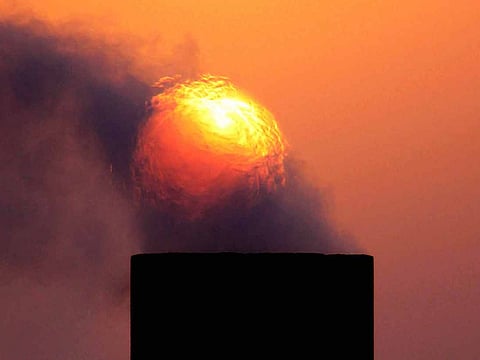Doha oil freeze talks delayed amid changes to draft accord
Sixteen nations representing about half the world's oil output have gathered in the Qatari capital for the meet

DOHA: Talks in Doha between some of the world's biggest oil producers have been delayed until later Sunday amid changes to a draft accord on freezing output, said two officials with knowledge of the discussions.
Related report: Draft Doha agreement would freeze output until October
The meeting was pushed back so the agreement could be amended, the two people said, asking not to be identified because the discussions are private.
Wording in the draft related to Iran - which isn't attending - is being changed, but this won't jeopardize a final agreement that is still set to be announced after talks start at 2 p.m. local time, one of the people said.
Sixteen nations representing about half the world's oil output have gathered in the Qatari capital in a bid to stabilize the global market. Saudi Arabia and Russia have approved a deal to freeze crude output at January levels until October 1 and other producers are expected to do so, Omani Oil Minister Mohammed Al Rumhy said prior to the meeting.
Crude oil has rallied more than 30 percent since the freeze accord was first mooted in February. On April 14, Saudi Arabia's Deputy Crown Prince said the nation wouldn't agree to restrain its production unless other producers, including Iran, agree to freeze. Iran, which had considered sending a representative to Doha, decided not to. If the group were to fail to reach an agreement it would lead to a "severe" drop in prices, Citigroup Inc. predicted before the meeting.
Ministers held informal closed-door talks earlier Sunday, according to two officials with knowledge of the meeting. Delegates will visit the palace of the Emir of Qatar and begin talks when they return, said another person with knowledge of the talks. Everybody is "optimistic," Kuwait's Acting Oil Minister Anas al-Saleh said before the meeting, adding that a deal would "hopefully happen."
Saudi Position
Saudi Arabia, the world's biggest crude exporter, would cap its market share at about 10.3 million to 10.4 million barrels a day, if other producers agreed to the freeze, Prince Mohammad Bin Salman said during an interview April 14 at ing Salman's private farm in Diriyah. Iran's oil minister, Bijan Namdar Zanganeh, said Saturday he won't attend the Doha talks and won't be a signatory to any deal as it would amount to self-imposed sanctions on the country which is restoring crude production after the removal of a ban on its shipments.
"If all major producers don't freeze production, we will not freeze production," said Prince Mohammed, 30, who has emerged as Saudi Arabia's leading economic force. "If we don't freeze, then we will sell at any opportunity we get."
Russian Outlook
The freeze agreement has no enforcement mechanism, Oman's Al Rumhy said, though he said he expects everyone to stick to it. The pact is open for other producers to join, he said.
A Russian official said Saturday that it was possible to reach a deal regardless of Iran, whose crude shipments have risen by more than 600,000 barrels a day this month. That increase has added to the pressure on producer nations to reach an agreement to prop up prices as economies from Venezuela to Nigeria reel from the market rout.
"A no-show by the Iranians is actually positive for the Doha talks as all know that they wouldn't agree at this stage," said John Sfakianakis, director of economics research at the Gulf Research Center. "The Iranian participation issue is not significant and will be reconsidered down the road. There is enough momentum with the rest of the members now."
The meeting in Doha is only relevant if no deal is reached, prompting a sharp sell-off in the markets, according to Ed Morse, head of commodities research at Citigroup Inc.
The recent rebound in oil futures suggests that the 20-month sell-off could be hitting a bottom, amid efforts to reduce the supply glut, OPEC Secretary General Abdulla El-Badri said in a statement posted on Saturday on the website of the International Monetary Fund.
Brent crude settled at $43.10 a barrel Friday in London, having risen by more than 50 percent from a 12-year low in January.



